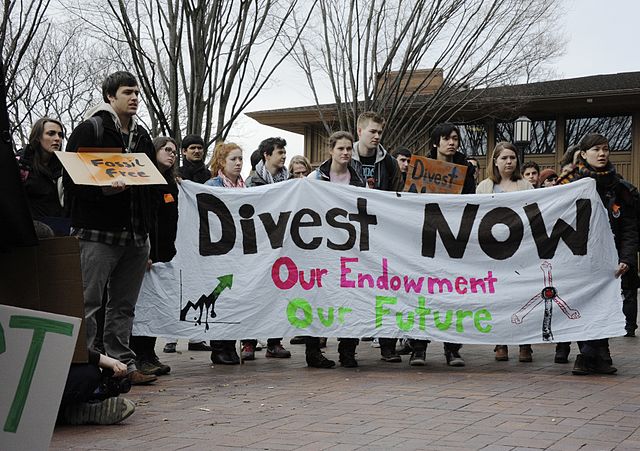Yes
The University of Sussex is renowned as a progressive institution, however it continues to invest in fossil fuel exploration in direct contradiction with UN and international climate change agreements.
This totals about 5% of its £9.07 million investment fund going towards fossil fuel exploration companies such as Shell, BP and Rio Tinto.
This investment is out of step with the rest of its ethical investment portfolio, which avoids investment in arms and tobacco. This contradiction is found by simply considering the share value of the fossil fuel companies in which Sussex invests.
It is widely acknowledged that for the UN goal of just a 2˚ C increase in global temperatures to be met, at least two thirds of known fossil fuels must stay ‘in the ground’, yet the high value of energy companies share price is based upon the belief that they will, in the future, extract these two thirds of fossil fuels in direct conflict with international agreement.
By investing in fossil fuels, our university is relying on these international aims not being met. To put it simply, if the UN targets on climate change are met, Sussex will lose money on these investments. This is clearly an unethical position for any institution to take.
This decision by our university is clearly wrong from an ethical perspective, but also from a pragmatic, financial one. Even before the drop in the oil price, analysts have warned against investing in companies whose value stems from reserves that cannot be used.
The governor of the Bank of England Mark Carney said in 2014 that ‘the vast majority of fossil fuel reserves are unburnable’; this is referred to as the ‘carbon bubble’.
The Sussex University 2013-14 financial statement read that one of the University’s primary targets is ‘maintaining financial sustainability over the planning period 2013-18’. It is clear that investment in fossil fuels directly contradicts this aim.
Furthermore, it is evident that Sussex could divest without damaging short-term returns. Fossil fuel investment as a proportion of its endowment at 5% is relatively small, so they could be divested easily without damaging overall returns.
In fact, recent analysis by MSCI, the world’s leading stock market index company, indicated that portfolios free of fossil fuel investments outperformed those with assets in fossil fuel companies over the last five years.
Over time, higher and safer returns could be achieved by investing in areas that have genuine opportunity for growth and are not directly causing the climate change crisis.
If the financial arguments for divestment are strong, the ethical case continues to be profound.
The last generation saw the biggest moral issue in the world as apartheid in South Africa; institutions of the West cut their economic ties with companies that propped up the apartheid regime. Today, progressive world leaders including Archbishop Desmond Tutu see divestment from fossil fuels in the same light.
A 2009 UCL study found that, ‘climate change was the biggest global-health threat of the 21st century.’ It is morally wrong for Sussex to continue investing in industries which are contributing to this global health threat.
It is incredibly hypocritical for Sussex to portray itself as a green institution, while continuing to invest in companies that are directly causing climate change.
Finally, it is worth noting that the aim of divestment is not, and cannot be, to bankrupt the fossil fuel industry financially, but instead to cause ‘ethical and political damage’.
Research by Oxford University highlighted that that the damage to the fossil fuel industry will not be felt financially but rather, in terms of reputation.
Some have argued that owning shares allowed institutions to engage with fossil fuel companies, however with regard to the precedent of the 21st century so far, it is clear that this has failed. Unfortunately in an industry worth trillions of pounds, opportunity for engagement does not exist.
Unless there is political pressure, nothing will change. Sussex must join the 400 organisations and institutions, such as the universities of Stanford, Oxford, and California, as well as the world’s biggest sovereign wealth fund and the Rockefeller foundation, that have pulled a combined $2.6 trillion dollars of investments from fossil fuel companies. Sussex must make the right financial and ethical decision, and divest from fossil fuel exploration.
Robert O’Leary
No
There are two arguments for divestment from fossil fuels, one practical and the other moral. Both fall apart under the weight of basic economics.
The practical argument asserts that, if the University and other institutional investors sell Shell, BP and Rio Tinto stocks, fossil fuel exploration companies will be less able to raise the capital they require.
This needs some explaining. Firms issue stocks, which represent a share in the company’s profits, in order to raise money to sustain and expand their operations. This is known as “equity financing”.
How much money they can get for each share depends on the market price. Therefore, if institutions like the University of Sussex cut their demand, the argument goes, the price should fall. Then, BP et al. will find they have to sell more shares to raise the same amount of capital—this is bad news because it dilutes the ownership of the original shareholders, whose interests the company is supposed to serve.
A pretty solid argument, right? Wrong. Stock prices are impervious to trendy campaigns, because they ultimately depend on “fundamental values,” which investors work out by estimating a company’s future dividends. If stock prices fall at all because of divestment dumping, then unscrupulous speculators will swoop on the undervalued stocks, bidding their prices back up until they are once again in line with the discounted value of future dividends. To summarise, divestment has no influence on a company’s ability to raise capital.
Note also that, as a matter of definition, you cannot sell anything without a buyer. If the University were to divest itself of its dirty holdings, the stocks would not simply disappear into Paul Brunton’s ‘The Void’; no, those stocks would be transferred onto the portfolios of investors with less of an interest in the environment. This matters because shareholders grasp the reigns of power: it is they who elect the Board of Directors. As the World Coal Association points out, divestment will simply cause environmentally conscious investors to lose influence over the fossil fuel industry.
Furthermore, there is evidence to suggest divestment harms the divesting institution. One study by Daniel Fischer, an emeritus professor at the University of Chicago Law School, estimates a portfolio that excludes fossil fuels generates 0.7 percent less return annually. To put this into perspective, given that the University’s portfolio is worth £8 million, and that according to the Intergovernmental Panel on Climate Change we can keep using fossil fuels until 2100, the University would lose out on just under £6.5 million if it divested tomorrow. Truly, divestment is all pain and no gain.
What of the moral argument? Proponents might counter by saying that, regardless of whether or not divestment is effective, it is wrong to profit from the activities of the fossil fuel industry. Given that the University of Sussex deliberately excludes arms manufacturers and tobacco companies from its portfolio, this seems a strong argument.
But it is not. As an economist from the Institute for Energy Research argues, “using fossil fuels isn’t immoral in the same way that, say, taking a guy’s wallet would be.” He says: “even the computer models selected by the Obama administration to measure the social cost of carbon don’t say that fossil fuel use should stop—instead they simply conclude that humans ought to cut back on the margin to make the benefits and costs come into synch.”
That is, the problem of fossil fuels is that we are currently using them in excess, so that the benefits they provide are being outweighed by the costs they incur in terms of future global warming. The solution, therefore, is to cut back on our use—but not to stop altogether. Thus, it is by no means a black-and-white issue of morality: while no amount of murder is ok, some amount of fossil fuel burning is.
In short, divestment’s advocates fundamentally misunderstand the nature of the global warming problem. It is not a moral problem but a technical issue of cost-benefit analysis. Furthermore, divestment has no effect on the fossil fuel industry, but does inflict real losses on the portfolios of divesting institutions.
Mark Tovey
Image: Wikimedia Commons






Mark Tovey is right. Disinvestment from fossil fuels is just a rather foolish attempt to occupy a mythical moral high ground. For a start, Sussex University’s investment is rather small in an industry where a typical capital cost for a project will cost £billions; to drill one North Sea oil well costs of the order $50million. This disinvestment therefore is rather useless political posturing. It also ignores the fact that technologies for replacing fossil fuels are either immature or imperfect. Nuclear power may not produce CO2 but it does produce quantities of radioactive waste and the risk of Fukushima type incidents. Renewable energy is promising but requires subsidy to make it competitive – wind and solar power requires gas-fired power stations to supply power when the weather is not right. The disinvestment argument also ignores the role for CCS (Carbon Capture and Storage), an emerging technology that captures CO2 from fossil fuel power plants and stores it underground.
Robert O’Leary has made some very convincing points in his article
I belive the following link may be relivant :
Climate change and the risk of stranded assets have been named as two major areas of increasing investor focus and concern in the latest global survey of institutional investors by Ernst & Young.
http://cleantechnica.com/2015/10/23/investors-finally-focusing-on-risk-of-stranded-assets-says-ernst-young/